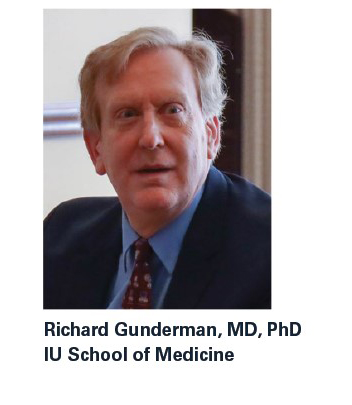By Richard Gunderman, MD, PhD
IU School of Medicine

Sticks and stones may break our bones, but words can also harm us. One such word is provider. When used to refer to physicians, it damages every medical professional’s morale, sense of worth, and fulfillment. It undermines our sense of calling.
The term provider was introduced in the 1960s through Medicare and Medicaid legislation, referring to someone eligible to receive payment -- in other words, a contractor who could be paid for health-related services.
The term encompasses an incredible hodgepodge of health professionals, including, but not limited to, dentists, occupational and physical therapists, optometrists, physician assistants, nurse practitioners, and social workers. It also refers to practices and hospitals.
The term’s elasticity inevitably leads to confusion, especially for patients. Do all providers have the same level of training, knowledge, and skills? When was the last time you heard a flight attendant call for attention and ask, “Is there a provider on board?”
“Provider” suggests that medicine is about money, not care. Payers may see medicine as transactional in terms of generating RVUs or revenue, but physicians need not sit idly by as care is commodified and medicine is turned into a business.
Physicians' work cannot be boiled down to coding and billing, nor are we merely dispensing tests, medicines, and procedures. Instead, our very reason for being, which should inform everything we do, is to care for patients.
“Provider” implies a one-way, transactional relationship, a transfer of a commodity from one who has it to one who has not. Good medical care, by contrast, is a two-way relationship, even a mutual one, in which physicians and patients work together in pursuit of healing and comfort.
The American Academy of Family Practice has written, “The term ‘provider’ implies that the relationship between the patient and physician is a commercial transaction.” Yet medicine is not essentially a “market-based enterprise based on a market ethic.”
The motto of the marketplace is caveat emptor, buyer beware. Where a market ethic predominates, as in car sales, customers must always be on guard lest they be taken advantage of. In medicine, by contrast, we strive to be worthy of our patients’ trust.
It is all too common to hear providers divided into tiers, such as low-level, mid-level, and high-level providers. Just imagine how discouraging it would be for our colleagues in other health professions to intro-duce themselves as “mid-level” or “low-level” providers.
The question is not what is merely accurate or inaccurate. Instead, it is one of appropriateness. You might in truth refer to your wife or husband as your current spouse, but doing so would likely provoke considerable anxiety or resentment.
Suppose we began badging all non-patient-facing hospital employees as “NPF employees,” regardless of whether they worked in housekeeping, coding and billing, or the C-suite. The term is accurate, but does it clarify or obscure roles?
Consider health professions education. Would anyone suggest that my employer, the Indiana University School of Medicine, change its name to the Indiana University School of Providers, or High-Level Providers? Such a change would seem absurd.
The American Medical Association has written, “’Provider’ is inadequate to describe the extensive education and qualifications of physicians,” and advises physicians to “insist on being identified as physicians and sign only documents that identity us as such.”
The AMA further declares, "All references to physicians by government, other payers, contracts, advertising, and published works should distinguish between physicians and non-physicians.” Nurses, too, should be called nurses, not providers.
William Osler, perhaps America’s most admired physician, reminded us that medicine depends first and foremost not on payment eligibility but on trust, professionalism, and putting patients before ourselves and the organizations we work for.
The future of medicine hangs in the balance, not just for those currently in practice but for generations of physicians still to come, our professional children and grandchildren. Will they join a trusted profession or merely take jobs as healthcare vendors?
Happily, the Indiana State Medical Association has passed a resolution opposing using the term “provider” or “healthcare provider” to refer to a physician. Yet this has not stopped many Hoosier health care organizations from continuing to do so.
George Orwell famously wrote, “If you control the language, you control the argument. If you control the argument, you control information. If you control information, you control history. And if you control history, you control the future.”
If we name those who practice medicine appropriately, we will be contributing to our wholeness, which is to say, our professional health and integrity. If we allow ourselves to be named inappropriately, we will sow seeds of distress and despair.